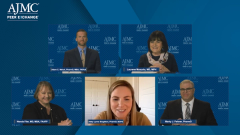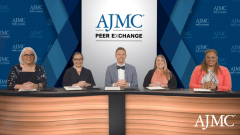
Promoting Awareness for RSV Vaccines: Part 2
Discussion surrounding promotion of RSV vaccine awareness is further discussed.
Episodes in this series

Adam C. Welch, PharmD, MBA, FAPhA: Patients could theoretically get their first nudge in primary care, and then they go to see a pharmacist and get another nudge about the vaccine, and then they see another provider and continue to get the same consistent message about the importance of RSV [respiratory syncytial virus] vaccines. After a while, the cumulative effect of those nudges may lead to a person making the informed decision to get vaccinated.
Wanda Filer, MD, MBA, FAAFP: Hopefully, they’ll hear from their next-door neighbor or someone at church that they got the vaccine and it didn’t bother them much and they are glad they’re protected. Or, to your point, they will hear it from the radio station or their local health reporter. We’re in this together.
Marty J. Feltner, PharmD: The best advertisement is word of mouth. Persons 65 years and older, where do they go? They have coffee every morning with their friends. They’re going to say, “Hey, did you get that new RSV vaccine?” The same thing happened when we had the herpes zoster vaccine. A spike in vaccinations occurred once that word-of-mouth advertisement came about.
Laurene Mascola, MD, MPH: Especially considering those who have had RSV last year, when there were a lot of individuals with the triple-demic and a lot of patients were being hospitalized. If they said, “I’m so glad there’s a vaccine out. I was so sick with that, and I wasn’t expecting it, and I was hospitalized—I felt terrible.” It’s like some persons who never get the flu vaccine; all they need to do is get the flu and then they’re die-hard flu vaccine advocates from then on.
Adam C. Welch, PharmD, MBA, FAPhA: They’ll step out of their medical home and into an immunization neighborhood that will be there to help with their vaccination. But one concern that I do have is with all the misinformation that came out with COVID-19; RSV vaccine was not accelerated in its approval process like COVID-19 was. We were in urgent times. We needed to get the vaccine out fast, and we did. How is this going to be different? How can we manage the misinformation that may occur in our patients with RSV?
Marty J. Feltner, PharmD: I think we’ll be more successful because it wasn’t fast-tracked from the health care community. We can do direct-to-patient marketing to start to educate the public on RSV disease that does occur in the adult population. That’s step 1 to get rid of the misconception that it only occurs in our pediatric population.
Laurene Mascola, MD, MPH: Also important is the fact that we’ve always been treating young children with a monoclonal antibody to prevent RSV infection. We’re looking at vaccinating mothers, potentially pregnant women, to prevent disease in their children. RSV has been on the radar for many years. Many have always thought of it as a childhood disease, but bringing it into the adult mindset it’s not so much a leap like it was with some of the COVID-19 vaccines where, again, this is all brand-new. Vaccines were all brand-new. We’ve been talking about RSV disease in children for many years and the prophylaxis, and in fact a lot of doctors have been angry about how the monoclonals get released and who pays for them. I think this will just be a natural progression from maternal disease and childhood disease into the adult age group now.
Wanda Filer, MD, MBA, FAAFP: You mentioned a medical neighborhood or immunization neighborhood. I love that. There’s a group that you may be familiar with called Vaccinate Your Family, and they’ve got a whole campaign reigniting a culture of immunization. What they’ve been able to leverage is individuals who are survivors. Some who work with Vaccinate Your Family have lost very young, healthy loved ones to vaccine-preventable illnesses, so this is very real for them. Having those patients who have survived an illness, who are the ambassadors whose lives have been touched by vaccine-preventable illness, goes a long way to help carry the message of the importance of all of us looking out for ourselves and our communities.
Transcript edited for clarity.
Newsletter
Stay ahead of policy, cost, and value—subscribe to AJMC for expert insights at the intersection of clinical care and health economics.











